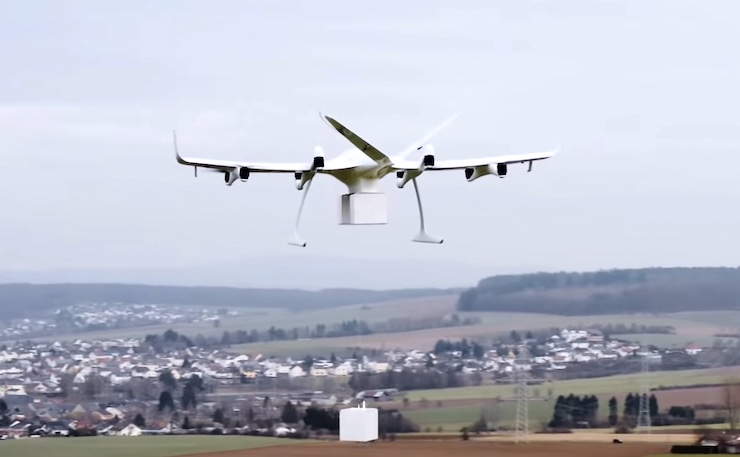
Two of the world’s leading drone delivery companies are spreading their wings this month. San Francisco-based Zipline, which pioneered the use of UAVs for emergency medical supply deliveries in Rwanda back in 2016, is continuing to make a fresh mark in the retail sector. Last week, the eight-year old company began drone flights of food and consumer goods in Mendocino County, California, utilizing the firm’s state-of-the-art P2 drone.
Meanwhile, Germany-based Wingcopter, a one-time Zipline competitor in Africa, is also making a fresh foray into aerial food deliveries in remote rural areas outside of Hesse. Like Zipline, the six-year old company appears to be transitioning out of the medical supply niche and embracing the retail goods sector, which many industry analysts believe is now poised for a dramatic and unprecedented expansion.
Each of the two companies appears intent on pioneering a drone delivery model that offers distinct advantages over its competition. This is especially true in the case of Zipline, which can fly fleets of drones concurrently to pick up and deliver goods from multiple store outlets, utilizing a network of charging stations to make those deliveries on demand, without the need to return to an original launching port. Zipline also has authority from the FAA — obtained this past summer – to conduct its aerial operations on a Beyond Visual Line of Sight (BVLOS) basis, which means it can extend its flights over long distances, without the need for remote piloting or visual observation.
Another feature of the Zipline model is the installation of automated in-store platforms that effectively eliminate the need for workers to load goods onto the company’s drones manually, thereby saving both time and cost. The goods are loaded into a plastic cabinet known as a druid that comes equipped with remotely controlled fans that can guide the enclosed box with precision to a variety of landing zones, including back porches and even picnic tables. The drone hovers over the delivery site and lowers the druid down on a cable, which automatically releases the box upon landing.
Zipline’s latest store partnership is with Mendocino Farms, which provides ready-to-eat food to customers in Northern and Southern California. Zipline has similar drone operations in place in Dallas-Ft. Worth (with Walmart) – one of the nation’s leading drone hubs – and plans to expand its unique delivery model into Washington State later this year. No other drone company is currently situated to operate at scale in so many different US locations, making Zipline an industry pioneer and trend-setter.
Wingcopter is still planning to conduct “last mile” deliveries with drones traveling point-to-point to service customers within a circumscribed geographic zone. But the company has abandoned the idea of servicing customers directly at their homes. Instead, the company’s drones will drop ordered goods at local community centers and then electric bicycles and scooters will transport the food cargo to homes. This delivery system allows for goods from multiple customers to be transported and delivered together (as needed). And without the need for drones to fly separate routes and hover over individual homes, they can make their cargo deliveries faster.
Wingcopter’s Hesse operation is especially welcome because the area is remote and difficult to access. In addition, small stores in that region have been disappearing over many years, requiring local residents to drive 10 kms or more simply to shop for basic goods. Wingcopter is planning to limit deliveries to non-perishable milk, eggs, fruit and vegetables, canned food, and many other non-refrigerated products. If the pilot operation succeeds, it will likely become a model for retail drone deliveries in other parts of Germany outside the major cities
Wingcopter and Zipline’s expansion plans derive from the two firms’ recent success in obtaining investment capital. In May, the German drone firm received a commitment of $44 million from the European Investment Bank, on the heels of previous rounds that brought in $110 million. Zipline last month raised a whopping $330 million, giving the firm a valuation of $4.2 billion, second only to China’s DJI, with a reported valuation of $15 billion.
|